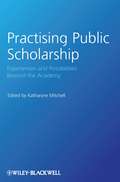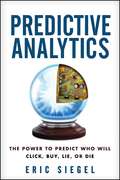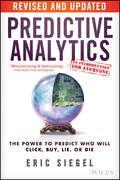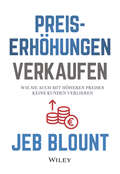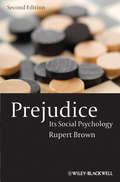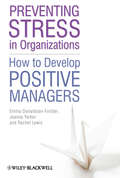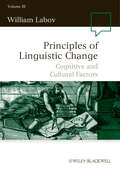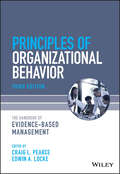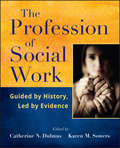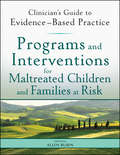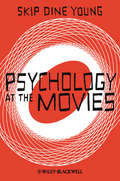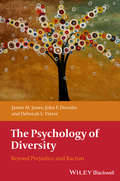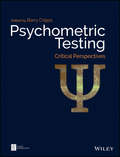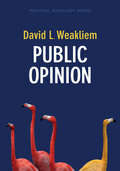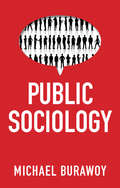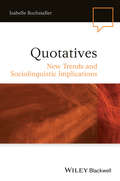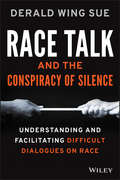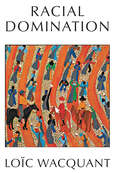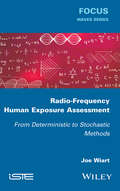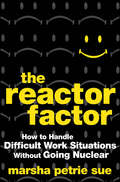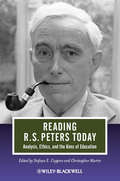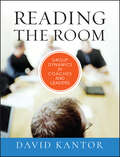- Table View
- List View
Practising Public Scholarship: Experiences and Possibilities Beyond the Academy (Antipode Book Series #40)
by Katharyne MitchellA cross-disciplinary collection of 20 essays describing the journey to public scholarship, exploring the pleasures and perils associated with breaching the town-gown divide. Includes contributions from departments of geography, comparative literature, sociology, communications, history, English, public health, and biology Discusses their efforts to reach beyond the academy and to make their ideas and research broadly accessible to a wider audience Opens the way for a new kind of democratic politics—one based on grounded concepts and meaningful social participation Includes deeply personal accounts about the journey to becoming a public scholar and to intervening politically in the world, while remaining within a university system Provides a broad prescription for social change, both within and outside the university
Praxishandbuch Integrale Organisationsentwicklung: Grundlagen für zukunftsfähige Organisationen entwickeln
by Heiko VeitIntegrale Organisationsentwicklung - bewusst, integral und wirkungsvoll! Der Ruf nach agileren, flexibleren Organisationen, die sinnstiftend tätig sind, wird immer lauter. Nachhaltigkeit, Corporate Social Responsibility und dergleichen mehr bedingen ein neues Verständnis von Organisation. Die alten Modelle sind überholt und es braucht eine neue Form von Orientierung. Hier braucht es dringend ein pragmatisches und trotzdem entwicklungsförderliches Modell, ein Modell, welches den Prozess in den Vordergrund stellt. Die Integrale Organisationsentwicklung stellt ein Modell für die Beschreibung, Gestaltung und Reflexion von Prozessen zur Verfügung. Wenn Sie mehr über Integrale Organisationsentwicklung erfahren und Ihre Kompetenz erweitern möchten, dann ist das Buch von Heiko Veit genau das Richtige für Sie! Das Praxishandbuch Integrale Organisationsentwicklung beschreibt eine Landkarte für die gesamte Komplexität von Entwicklungsprozessen in Organisationen. Es zeigt, wie man sich selbst sowie die Organisation in dieser Landkarte verortet und wie man Wege finden kann, wenn man in der Realität etwas verändern möchte. Das Buch betont die Rolle der eigenen Entwicklungsstufe, wenn man sich mit Organisationsentwicklung beschäftigt. Darüber hinaus enthält es viele Denkmodelle auf dem Weg zu einer integralen Organisation. Es zeigt, wie man eine gesunde Basis schaffen kann, um eine sinnvolle Weiterentwicklung von evolutionären Prinzipien hin zu mehr Komplexität, Sinn, Ordnung, Erkenntnis und Vertrauen im Business-Kontext zu erreichen.
Predictive Analytics
by Thomas H. Davenport Eric Siegel"The Freakonomics of big data."--Stein Kretsinger, founding executive of Advertising.com; former lead analyst at Capital OneThis book is easily understood by all readers. Rather than a "how to" for hands-on techies, the book entices lay-readers and experts alike by covering new case studies and the latest state-of-the-art techniques.You have been predicted -- by companies, governments, law enforcement, hospitals, and universities. Their computers say, "I knew you were going to do that!" These institutions are seizing upon the power to predict whether you're going to click, buy, lie, or die.Why? For good reason: predicting human behavior combats financial risk, fortifies healthcare, conquers spam, toughens crime fighting, and boosts sales.How? Prediction is powered by the world's most potent, booming unnatural resource: data. Accumulated in large part as the by-product of routine tasks, data is the unsalted, flavorless residue deposited en masse as organizations churn away. Surprise! This heap of refuse is a gold mine. Big data embodies an extraordinary wealth of experience from which to learn.Predictive analytics unleashes the power of data. With this technology, the computer literally learns from data how to predict the future behavior of individuals. Perfect prediction is not possible, but putting odds on the future -- lifting a bit of the fog off our hazy view of tomorrow -- means pay dirt.In this rich, entertaining primer, former Columbia University professor and Predictive Analytics World founder Eric Siegel reveals the power and perils of prediction:What type of mortgage risk Chase Bank predicted before the recession.Predicting which people will drop out of school, cancel a subscription, or get divorced before they are even aware of it themselves.Why early retirement decreases life expectancy and vegetarians miss fewer flights.Five reasons why organizations predict death, including one health insurance company.How U.S. Bank, European wireless carrier Telenor, and Obama's 2012 campaign calculated the way to most strongly influence each individual.How IBM's Watson computer used predictive modeling to answer questions and beat the human champs on TV's Jeopardy!How companies ascertain untold, private truths -- how Target figures out you're pregnant and Hewlett-Packard deduces you're about to quit your job.How judges and parole boards rely on crime-predicting computers to decide who stays in prison and who goes free.What's predicted by the BBC, Citibank, ConEd, Facebook, Ford, Google, IBM, the IRS, Match.com, MTV, Netflix, Pandora, PayPal, Pfizer, and Wikipedia. A truly omnipresent science, predictive analytics affects everyone, every day. Although largely unseen, it drives millions of decisions, determining whom to call, mail, investigate, incarcerate, set up on a date, or medicate.Predictive analytics transcends human perception. This book's final chapter answers the riddle: What often happens to you that cannot be witnessed, and that you can't even be sure has happened afterward -- but that can be predicted in advance?Whether you are a consumer of it -- or consumed by it -- get a handle on the power of Predictive Analytics.
Predictive Analytics
by Eric Siegel"Mesmerizing & fascinating..." --The Seattle Post-Intelligencer "The Freakonomics of big data." --Stein Kretsinger, founding executive of Advertising.com Award-winning | Used by over 30 universities | Translated into 9 languages An introduction for everyone. In this rich, fascinating -- surprisingly accessible -- introduction, leading expert Eric Siegel reveals how predictive analytics works, and how it affects everyone every day. Rather than a "how to" for hands-on techies, the book serves lay readers and experts alike by covering new case studies and the latest state-of-the-art techniques. Prediction is booming. It reinvents industries and runs the world. Companies, governments, law enforcement, hospitals, and universities are seizing upon the power. These institutions predict whether you're going to click, buy, lie, or die. Why? For good reason: predicting human behavior combats risk, boosts sales, fortifies healthcare, streamlines manufacturing, conquers spam, optimizes social networks, toughens crime fighting, and wins elections. How? Prediction is powered by the world's most potent, flourishing unnatural resource: data. Accumulated in large part as the by-product of routine tasks, data is the unsalted, flavorless residue deposited en masse as organizations churn away. Surprise! This heap of refuse is a gold mine. Big data embodies an extraordinary wealth of experience from which to learn. Predictive Analytics unleashes the power of data. With this technology, the computer literally learns from data how to predict the future behavior of individuals. Perfect prediction is not possible, but putting odds on the future drives millions of decisions more effectively, determining whom to call, mail, investigate, incarcerate, set up on a date, or medicate. In this lucid, captivating introduction -- now in its Revised and Updated edition -- former Columbia University professor and Predictive Analytics World founder Eric Siegel reveals the power and perils of prediction: What type of mortgage risk Chase Bank predicted before the recession. Predicting which people will drop out of school, cancel a subscription, or get divorced before they even know it themselves. Why early retirement predicts a shorter life expectancy and vegetarians miss fewer flights. Five reasons why organizations predict death -- including one health insurance company. How U.S. Bank and Obama for America calculated -- and Hillary for America 2016 plans to calculate -- the way to most strongly persuade each individual. Why the NSA wants all your data: machine learning supercomputers to fight terrorism. How IBM's Watson computer used predictive modeling to answer questions and beat the human champs on TV's Jeopardy! How companies ascertain untold, private truths -- how Target figures out you're pregnant and Hewlett-Packard deduces you're about to quit your job. How judges and parole boards rely on crime-predicting computers to decide how long convicts remain in prison. 182 examples from Airbnb, the BBC, Citibank, ConEd, Facebook, Ford, Google, the IRS, LinkedIn, Match.com, MTV, Netflix, PayPal, Pfizer, Spotify, Uber, UPS, Wikipedia, and more. How does predictive analytics work? This jam-packed book satisfies by demystifying the intriguing science under the hood. For future hands-on practitioners pursuing a career in the field, it sets a strong foundation, delivers the prerequisite knowledge, and whets your appetite for more. A truly omnipresent science, predictive analytics constantly affects our daily lives. Whether you
Preiserhöhungen verkaufen: Wie Sie auch mit höheren Preisen keine Kunden verlieren
by Jeb BlountPreiserhöhungsinitiativen - ob auf breiter Basis oder auf bestimmte Kunden ausgerichtet - machen den meisten den Vertriebsprofis und Kundenbetreuern, die sie ihren Kunden verkaufen sollen, Angst. Preiserhöhungen bei Kunden stehen ganz oben auf der Liste der Dinge, die Vertriebsmitarbeiter ungern tun, weil sie befürchten, dass Preiserhöhungen das Verkaufsvolumen verringern oder der Konkurrenz die Tür öffnen. Doch wenn man effektiv verkauft, akzeptieren die Kunden Preiserhöhungen, bleiben loyal und kaufen oft sogar mehr. In seinem neuen Buch zeigt der bekannte Verkaufstrainer Jeb Blount die Strategien, Taktiken, Techniken und Rahmenbedingungen auf, mit denen Verkäufer Preiserhöhungsinitiativen erfolgreich meistern können. Von der Ausarbeitung wirksamer Preiserhöhungsbotschaften über den Schutz hart erkämpfter Beziehungen und den Umgang mit gängigen Einwänden bis hin zur Argumentation für den von ihnen gebotenen Wert führt dieser umfassende Leitfaden Vertriebsmitarbeiter durch jeden Schritt des Verkaufsprozesses für Preiserhöhungen. In jedem Kapitel finden die Leser praktische Übungen, die ihnen helfen, das System "Preiserhöhung verkaufen" zu beherrschen. Mit jedem neuen Kapitel werden sie mehr und mehr Vertrauen in ihre Fähigkeit gewinnen, Kunden erfolgreich in Preiserhöhungsgespräche einzubeziehen. Das Buch ist ein unverzichtbares Handbuch für Vertriebsprofis, Kundenbetreuer, Kundenerfolgsteams und andere Führungskräfte im Bereich der Umsatzgenerierung, die einen spannenden und aufschlussreichen Leitfaden für die Navigation durch die wichtige - und nervenaufreibende - Welt der Preiserhöhungen suchen.
Prejudice: Its Social Psychology
by Rupert BrownThis new edition of Prejudice provides a comprehensive treatment of the subject, introducing the major theoretical ideas as well as providing a critical analysis of recent developments. Takes a social psychological perspective, analysing individual behavior as part of a pattern of intergroup processes Covers the major research, including classical personality accounts, developmental approaches, socio-cognitive research focussing on categorization and stereotyping, prejudice as an intergroup phenomenon, and ways to combat prejudice Illustrates concepts with examples of different kinds of prejudice drawn from everyday life Includes a new chapter on prejudice from the victim's perspective Fully updated throughout, with expansion of the notions of explicit and implicit manifestations of prejudice
Preventing Stress in Organizations
by Emma Donaldson-Feilder Joanna Yarker Rachel LewisPreventing Stress in Organizations:How to Develop Positive Managersoffers an innovative, evidence-based approach to help managers prevent and reduce workplace stress in their staff.Winner of the 2013 BPS Book Award - Practitioner Text categoryProvides information on the critical skills managers must develop in order to prevent stress in their staff, and the key ongoing behaviours that promote a healthy work environmentShows practitioners in occupational psychology, HR, Health and Safety and related professions how positive management can be integrated into an organizationâ TMs existing practices and processesServes as an essential guide for managers themselves on how to incorporate proven stress management skills into their everyday interactions with team membersBalances rigorous research grounding with real-world vignettes, case studies and exercises
Principles of Linguistic Change, Cognitive and Cultural Factors
by William LabovWritten by the world-renowned pioneer in the field of modern sociolinguistics, this volume examines the cognitive and cultural factors responsible for linguistic change, tracing the life history of these developments, from triggering events to driving forces and endpoints.Explores the major insights obtained by combining sociolinguistics with the results of dialect geography on a large scaleExamines the cognitive and cultural influences responsible for linguistic changeDemonstrates under what conditions dialects diverge from one anotherEstablishes an essential distinction between transmission within the community and diffusion across communitiesCompletes Labov's seminal Principles of Linguistic Change trilogy
Principles of Organizational Behavior: The Handbook of Evidence-Based Management
by Craig L. Pearce Edwin A. LockeExplore invaluable management advice informed by the latest in organizational and industrial behaviour research In the newly revised Third Edition of Handbook of Principles of Organizational Behavior: Indispensable Knowledge for Evidence-Based Management, world-renowned organizational behaviourists Edwin A. Locke and Craig L. Pearce deliver a comprehensive and authoritative discussion of sound management practices informed by the most recent evidence and research in organizational and industrial psychology. In the book, the authors present: Complimentary and downloadable video material linked to each chapter Executive interviews and author interviews, new cases, assessments, inventories and exercises Updated chapters written by world-leading experts on the covered topicsAn indispensable resource for students of human resources, organizational behaviour, industrial psychology, public administration and related subjects, Handbook of Principles of Organizational Behavior will assist students and professionals seeking the latest evidence-based management guidance.
Problem Spaces: How and Why Methodology Matters
by Celia LuryIn this innovative book, Celia Lury argues that the time has come for us to explore the world not only with new methods, but with a new approach to methodology itself. Fundamental changes are taking place in how we produce knowledge, how we communicate it and, indeed, what we consider to be knowledge. These changes demand innovative and creative responses to research questions. Lury's rethinking of the nature of social inquiry starts by reconceptualizing the 'problem space'. Problems are not static or a 'given'; rather, they are created and continually recomposed as part of the methodological process itself. Following the line of thought that methods are practices that articulate as much as capture a social problem, Lury further develops the notion of compositional methodology to think through its implications. With remarkable fluency, the book draws into conversation a range of hot-button issues, both longstanding and novel, from observation, reflexivity, recursive measurement and feminist methodologies, to participation, context, datafication and platformization. Always with an eye to the methodological potential of new trends, the book provides a strong challenge to much received wisdom and argues that a combination of techniques can contribute to better understanding of the problem spaces we all inhabit.
The Profession of Social Work
by Karen M. Sowers Catherine N. DulmusAn expert introduction to the foundations of the social work profession-from its historical roots to its evolution in an era of evidence-based practiceThe Profession of Social Work provides a broad overview of the history, scope, values, ethics, and organizational framework of the social work profession. Exploring professional ethics and human rights, evidence-based practice and practice-guided research, as well as emerging trends and issues, this important book presents topics of critical importance to anyone considering a career in social work.Each chapter in the text offers an array of pedagogical features, including Key Terms, Review Questions for Critical Thinking, and Online Resources.Ideal for introductory courses for both undergraduate and graduate students, The Profession of Social Work features coverage closely aligned with social work accreditation standards (EPAS) and includes chapters authored by established scholars on topics including:Social work historySocial work educationProfessional credentialing and regulationsValues and ethicsThe strengths perspective in social work practiceEvidence-based practice and improving the scientific base for social work practiceContemporary issues in social workWith a wealth of insider insights into and guidance on the profession of social work, this book is essential reading to prepare for a career in this field.
Programs and Interventions for Maltreated Children and Families at Risk
by Allen RubinEvidence-based interventions are increasingly being required by third-party payers and an evidence-based orientation has come to define ethical practice. This compendium of short, how-to chapters focuses on the programs and interventions to prevent child maltreatment that have the best scientific evidence supporting their effectiveness. Interventions and programs discussed include Cognitive Behavioral Therapy, EMDR, Multisystemic Therapy, Coping Cat, and many more. Busy practitioners will appreciate this book's implementation of evidence-based practices by providing the practical and "what now" rather than using the typical academic approach.
Psychology at the Movies
by Skip Dine YoungPsychology at the Movies explores the insights to be gained by applying various psychological lenses to popular films including cinematic depictions of human behavior, the psychology of filmmakers, and the impact of viewing movies.Uses the widest range of psychological approaches to explore movies, the people who make them, and the people who watch them Written in an accessible style with vivid examples from a diverse group of popular films, such as The Silence of the Lambs, The Wizard of Oz, Star Wars, Taxi Driver, Good Will Hunting, and A Beautiful MindBrings together psychology, film studies, mass communication, and cultural studies to provide an interdisciplinary perspectiveFeatures an extensive bibliography for further exploration of various research fields
The Psychology of Diversity: Beyond Prejudice and Racism (Coursesmart Ser.)
by James M. Jones John F. Dovidio Deborah L. VietzeThe Psychology of Diversity presents a captivating social-psychological study of diversity, the obstacles confronting it, and the benefits it provides. Goes beyond prejudice and discrimination to discuss the personal and social implications of diversity for both majority and minority group members Considers how historical, political, economic, and societal factors shape the way people think about and respond to diversity Explains why discrimination leads to bias at all levels in society – interpersonal, institutional, cultural, and social Describes proven techniques for improving intergroup relations Examines the brain's impact on bias in clear terms for students with little or no background in neuroscience Includes helpful study tools throughout the text as well as an online instructor’s manual
Psychometric Testing: Critical Perspectives (BPS Textbooks in Psychology)
by Barry CrippsPsychometric Testing offers an in-depth examination of the strengths and limitations psychometric testing, with coverage of diverse methods of test development and application. A state-of-the-art exploration of the contemporary field of psychometric testing, bringing together the latest theory and evidence-based practice from 21 global experts Explores a variety of topics related to the field, including test construction, use and applications in human resources and training, assessment and verification of training courses, and consulting Includes applications for clinical psychology, performance psychology, and sport and exercise psychology across a range of professions (research, teaching, coaching, consulting, and advising) Acknowledges the dynamic nature of the field and identifies future directions in need of more research, including Internet and smart phone testing
Psychosocial Treatment of Schizophrenia
by David W. Springer Allen Rubin Kathi TrawverPraise for the Clinician's Guide to Evidence-Based Practice Series"A major stumbling block to the adoption of evidence-based practice in the real world of clinical practice has been the absence of clinician-friendly guides suitable for learning specific empirically supported treatments. Such guides need to be understandable, free of technical research jargon, infused with clinical expertise, and rich with real-life examples. Rubin and Springer have hit a home run with the Clinician's Guide to Evidence-Based Practice Series, which has all of these characteristics and more."-Edward J. Mullen, Willma and Albert Musher Chair Professor, Columbia UniversityState-of-the-art, empirical support for psychosocial treatment of schizophrenia Part of the Clinician's Guide to Evidence-Based Practice Series, Psychosocial Treatment of Schizophrenia provides busy mental health practitioners with detailed, step-by-step guidance for implementing clinical interventions that are supported by the latest scientific evidence. This thorough, yet practical, reference draws on a roster of experts and researchers in the field who have assembled state-of-the-art knowledge into this well-rounded guide. Each chapter serves as a practitioner-focused how-to reference and covers interventions that have the best empirical support for the psychosocial treatment of schizophrenia, including:Cognitive behavioral therapyAssertive community treatmentCritical time interventionMotivational interviewing for medication adherencePsychoeducational family groupsIllness management and recoveryEasy-to-use and accessible in tone, Psychosocial Treatment of Schizophrenia is an indispensable resource for practitioners who would like to implement evidence-based, compassionate, effective interventions in the care of people with schizophrenia.
Public Opinion (Political Sociology)
by David L. WeakliemIs political polarization on the rise? Do various “populist” movements have anything in common? Is the opposition between left and right becoming obsolete and, if so, what might replace it? Many of the most pressing questions about contemporary politics involve public opinion. This incisive sociological introduction considers the formation of opinions as not just a matter of individual responses to external conditions, but as a social process in which people influence and are in turn influenced by others. David L. Weakliem illustrates how changes in economic and social conditions affect public opinion and how the distribution of opinions is shaped by the structure of interaction among people. He applies this approach to discuss topics such as political polarization, long-term trends in public opinion, and the prospects for democracy. Combining theory with up-to-date information on public opinion, the book will be of interest to researchers and students alike in sociology, political science, and communication studies.
Public Sociology: Ethics And Engagement
by Michael BurawoyMichael Burawoy has helped to reshape the theory and practice of sociology across the Western world. Public Sociology is his most thoroughgoing attempt to explore what a truly committed, engaged sociology should look like in the twenty-first century. Burawoy looks back on the defining moments of his intellectual journey, exploring his pivotal early experiences as a researcher, such as his fieldwork in a Zambian copper mine and a Chicago factory. He recounts his time as a graduate and professor during the ideological ferment in sociology departments of the 1970s, and explores how his experiences intersected with a changing political and intellectual world up to the present. Recalling Max Weber, Burawoy argues that sociology is much more than just a discipline – it is a vocation, to be practiced everywhere and by everyone.
Quotatives
by Isabelle BuchstallerQuotatives considers the phenomenon "quotation" from a wealth of perspectives. It consolidates findings from different strands of research, combining formal and functional approaches for the definition of reported discourse and situating the phenomenon in a broader typological and sociolinguistic perspective.Provides an interface between sociolinguistic research and other linguistic disciplines, in particular discourse analysis, typology, construction grammar but also more formal approachesIncorporates innovative methodology that draws on discourse analytic, typological and sociolinguistic approachesInvestigates the system both in its diachronic development as well as via cross-variety comparisonsPresents careful definition of the envelope of variation and considers alternative definitions of the phenomenon "quotation"Empirical findings are reported from distribution and perception data, which allows comparing and contrasting perception and reality
Race Talk and the Conspiracy of Silence
by Derald Wing SueLearn to talk about race openly, honestly, and productively Most people avoid discussion of race-related topics because ofthe strong emotions and feelings of discomfort that inevitablyaccompany such conversations. Rather than endure the conflict ofracial realities, many people choose instead to avoid the topicaltogether, or remain silent when it is raised. Race Talk andthe Conspiracy of Silence: Understanding and Facilitating DifficultDialogues on Race puts an end to that dynamic by sharingstrategies for smoothing conversations about race in a productivemanner.A guide for facilitating and participating in difficultdialogues about race, author Derald Wing Sue - aninternationally recognized expert on multiculturalism, diversity,and microaggressions - explores the characteristics,dynamics, and meaning behind discussions about race as well as thehidden "ground rules" that inhibit honest and productive dialogue.Through emotional and visceral examples, this book explains whyconversations revolving around racial issues are so difficult, andprovides guidelines, techniques, and advice for navigating andleading honest and forthright discussions. Readers will develop astronger ability to build rapport with people unlike themselves,and discover how not talking about race impacts society as awhole.Overcome and make visible the fears associated with racetalkLearn practical ideas for talking openly about raceFacilitate and navigate discussion with expert strategyExamine the hidden rules that govern race talkUnderstand the benefits of successful conversationsDiscussions about race do not have to result in disastrousconsequences, and can in fact be highly beneficial to all partiesinvolved. It's important that people have the ability to converseopenly and honestly with their students, colleagues, children, andneighbors, and Race Talk provides the path for achievingthis goal.
Racial Domination
by Loïc WacquantRace is arguably the single most troublesome and volatile concept of the social sciences in the early 21st century. It is invoked to explain all manner of historical phenomena and current issues, from slavery to police brutality to acute poverty, and it is also used as a term of civic denunciation and moral condemnation. In this erudite and incisive book based on a panoramic mining of comparative and historical research from around the globe, Loïc Wacquant pours cold analytical water on this hot topic and infuses it with epistemological clarity, conceptual precision, and empirical breadth.Drawing on Gaston Bachelard, Max Weber, and Pierre Bourdieu, Wacquant first articulates a series of reframings, starting with dislodging the United States from its Archimedean position, in order to capture race-making as a form of symbolic violence. He then forges a set of novel concepts to rethink the nexus of racial classification and stratification: the continuum of ethnicity and race as disguised ethnicity, the diagonal of racialization and the pentad of ethnoracial domination, the checkerboard of violence and the dialectic of salience and consequentiality. This enables him to elaborate a meticulous critique of such fashionable notions as “structural racism” and “racial capitalism” that promise much but deliver little due to their semantic ambiguity and rhetorical malleability—notions that may even hamper the urgent fight against racial inequality.Wacquant turns to deploying this conceptual framework to dissect two formidable institutions of ethnoracial rule in America: Jim Crow and the prison. He draws on ethnographies and historiographies of white domination in the postbellum South to construct a robust analytical concept of Jim Crow as caste terrorism erected in the late 19th century. He unravels the deadly symbiosis between the black hyperghetto and the carceral archipelago that has coproduced and entrenched the material and symbolic marginality of the African-American precariat in the metropolis of the late 20th century. Wacquant concludes with reflections on the politics of knowledge and pointers on the vexed question of the relationship between social epistemology and racial justice.Both sharply focused and wide ranging, synthetic yet controversial, Racial Domination will be of interest to students and scholars of race and ethnicity, power and inequality, and epistemology and theory across the social sciences and humanities.
Radio-Frequency Human Exposure Assessment
by Joe WiartNowadays approximately 6 billion people use a mobile phone and they now take a central position within our daily lives. The 1990s saw a tremendous increase in the use of wireless systems and the democratization of this means of communication. To allow the communication of millions of phones, computers and, more recently, tablets to be connected, millions of access points and base station antennas have been extensively deployed. Small cells and the Internet of Things with the billions of connected objects will reinforce this trend. This growing use of wireless communications has been accompanied by a perception of risk to the public from exposure to radio frequency (RF) electromagnetic field (EMF). To address this concern, biomedical research has been conducted. It has also been important to develop and improve dosimetry methods and protocols that could be used to evaluate EMF exposure and check compliance with health limits. To achieve this, much effort has was made in the 1990s and 2000s. Experimental and numerical methods, including statistical methods, have been developed. This book provides an overview and description of the basic and advanced methods that have been developed for human RF exposure assessment. It covers experimental, numerical, deterministic and stochastic methods.
The Reactor Factor
by Sue Marsha PetrieHow to encourage personal responsibility and eliminate entitlement at work Marsha Petrie Sue, MBA, is a renowned professional speaker who addresses, among other topics, the business value of personal accountability at work. When leaders and workers are held personally responsible for their choices, results improve -- and the entitlement mentality is abolished. In The Reactor Factor, Petrie Sue combines her proven lessons on accountability from interviews with key business leaders to help readers understand how to maximize success and turn negative situations into positive business results, whether a leader or employee. This book shows you how to take charge of your professional future for long-term success. Petrie Sue guides you through the ongoing process of personal development and growth that will guarantee success for your career and organization. Marsha Petrie Sue is also the author of Toxic People: Decontaminate Difficult People Without Using Weapons and Duct Tape Teaches you how to make better decisions to achieve your goals Provides the skills and tactics you need to handle any situation at work Helps you focus on your strengths and remove blame Shows you how to learn from the past to improve your professional future The Reactor Factor is a practical and real-world guide to forging ahead professionally while improving your career, satisfaction, and success.
Reading R. S. Peters Today: Analysis, Ethics, and the Aims of Education (Journal of Philosophy of Education #21)
by Stefaan E. Cuypers Christopher MartinReading R. S. Peters Today: Analysis, Ethics and the Aims of Education reassesses British philosopher Richard Stanley Peters’ educational writings by examining them against the most recent developments in philosophy and practice. Critically reassesses R. S. Peters, a philosopher who had a profound influence on a generation of educationalists Brings clarity to a number of key educational questions Exposes mainstream, orthodox arguments to sympathetic critical scrutiny
Reading the Room
by David KantorPraise for Reading the Room "If you believe, as I do, that tackling our toughest problems in organizations and societies will require significant advances in the human domain of how we think and interact, then you will find this book a wonderful resource for a healthier future. "-Peter Senge, senior lecturer, leadership and sustainability, MIT Sloan School of Management; and founding chair, Society for Organizational Learning (SoL) "A must-read for anyone truly interested in gaining access to and managing their own actions/behavior as well as all those we work with, live with, and interact with. It will shift the way you, others, and the world occur for you. "-Michael C. Jensen, Jesse Isidor Straus Professor of Business Administration, emeritus, Harvard Business School "David Kantor is one of the very few master innovators and theorists in organizational leadership. In this combined story and practice guide, Kantor helps leaders see the hidden dynamics of the groups they lead, and the personal and social factors that shape their relationships with those groups. " -Art Kleiner, editor in chief, strategy+business "Kantor addresses the fundamental issue that leaders are surprisingly inept in conversation and in managing groups. Leaders and managers at all levels should be learning these concepts in order to improve their own ability to analyze what is going on and react appropriately. "-Edgar H. Schein, professor emeritus, MIT Sloan School of Management; and author, Helping: How to Offer, Give, and Receive Help "An exceptional book in the true sense of the word. It stands alone in its grasp of what it takes to succeed as a leader. It's not simply about mastering the five forces, milking cash cows, accelerating experience curves, or even spurring disruptive innovation. It's about reading the room. Leaders who gain mastery of what David Kantor has to teach in this book will achieve true success, not just as leaders, but as people. " -Diana M. Smith, chief executive partner, New Profit Inc. ; and author, The Elephant in the Room: How Relationships Make or Break the Success of Leaders and Organizations "There are only a few wise masters in the world when it comes to any real understanding of leader-ship, and even fewer who share their secrets. David Kantor is one of them, and in Reading the Room we have brilliantly laid out before us both a unique lens and a highly practical method that will change for good the way you lead, and more, the way you think. Not to be missed!" -William Isaacs, author, Dialogue and the Art of Thinking Together; and senior lecturer, MIT Sloan School of Management
